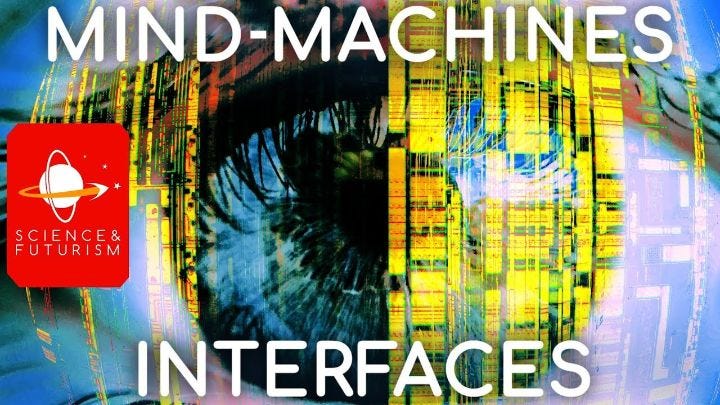Issue #230 - AlphaStar gets better at StarCraft II than 99.8% of players; AI learns to smell; is CRISPR the next antibiotic; how to fool military AI
View this email in your browser
This week - AlphaStar gets better at StarCraft II than 99.8% of players; AI learns to smell; is CRISPR the next antibiotic; how to fool military AI; and more!
MORE THAN A HUMAN
► Mind-Machine Interfaces (30:04)

The ability to link mind and machine has long been the realm of science fiction, but now improvements in our understanding may allow us to network brain to computer in the near future. Companies like Neurolink have begun to explore how to link our neurons to machine, and Isaac Arthur (subscribe to his channel if you haven't already, it's worth it) explores now such neural interfaces might function and how they might change our lives.
► Putting a Tesla Coil in an Artificial Leg (2:33)
If you were wanted to put a Tesla coil into a prosthetic leg, here is how you do it. The Tesla Coil leg was made for a bionic model Victoria Modesta in collaboration with Rolls-Royce and experts in prosthetics and performers using Tesla coils in their shows.
Five Ways You Can Already Become a Cyborg, One Body Part at a Time
Here's a list of five gadgets that can make you a cyborg, one augmentation at a time, from hearing aids to exoskeletons to an open-source DIY artificial pancreas.
► 'Minds have always been outside themselves': Raymond Tallis on extended cognition (9:00)
In this interview, Robert Lawrence Kuhn and Raymond Tallis discuss the idea of extended minds and how it applies to medical implants and smart devices that seemed to narrow the gap between human cognition and external objects
► The most advanced prosthetic in the world (12:11)
Albert Chi explains the crossroads of breakthrough surgery and breakthrough technology revealing the future of prosthetics that will change the world - the Modular Prosthetic Limb (MPL), delivering hope and possibility to all who have lost an upper extremity.
ARTIFICIAL INTELLIGENCE
AlphaStar: Grandmaster level in StarCraft II using multi-agent reinforcement learning

An update from DeepMind about the AlphaStar's progress. The AI has achieved the level of Grandmaster in all three races available in StarCraft II which makes it ranked above 99.8% of all active players. I wonder what will happen when AlphaStar plays against the top players. Who would you bet on?
Learning to Smell: Using Deep Learning to Predict the Olfactory Properties of Molecules
AI has learned to see and hear, and now it is learning to smell. In this blogpost, researchers from Google AI show how they trained an AI to predict the smell of a molecule based on its chemical representation.
A neural net solves the three-body problem 100 million times faster
Researchers from the University of Edinburgh have trained a neural network to solve the three-body problem and ended up with a method that provides accurate solutions at a fixed computational cost and up to 100 million times faster than a state-of-the-art conventional solver.
These Startups Are Building Tools to Keep an Eye on AI
After seeing some notable AI fails such as facial recognition algorithms that are less accurate on black faces or seeing AI entering the military, some people decided it is time to make tools to keep an eye on AI. This article lists three such companies (I'm guessing there are more out there) who advise AI developers how to avoid AIs making wrong decisions.
Military artificial intelligence can be easily and dangerously fooled

The militaries around the world realised how powerful AI can be on the battlefield and invest billions into getting a technological advantage. However, there are research projects showing that having an AI on your side can be also a weakness ready to be exploited by countering your AI with another AI designed to fool or take control over your AI.
ROBOTICS
The Marines are testing drone medicine deliveries
The US Marine Corps has successfully tested autonomous medical drone deliveries during four exercises in Australia, working with the Australian military and drone logistics company Zipline. The aim was to prove that drones could autonomously deliver medicine, critical care, or other vital supplies in a war zone.
Biohybrid robots, the next step in the robotic revolution
Soft robotics is one of the trends in robotics that takes more attention and promises robots that can go where no robot went before. But some researchers go one step further - how about making soft robots our of living tissues - biorobots?
Robot Teaches Kids Hand Washing Skills in Rural India
Meet Pepe, a social robot that encourages kids in India to wash their hands and therefore reduce water and sanitation-related diseases in rural India.
BIOTECHNOLOGY
Top synthetic biology news from academic labs in 2019
Looks like we are slowly entering the Best of 2019 season with SynBioBeta highlighting the most exciting academic synthetic biology articles in 2019 so far.
Is CRISPR the Next Antibiotic?
Could CRISPR, the wunderkind of synthetic biology, save us from the superbug epidemic? Dr David Edgell and his colleagues think yes, it can, and they have proven this by using CRISPR to eliminate a species of Salmonella. By programming the Cas9 enzyme to view the bacterium itself as the enemy, Dr Edgell and his colleagues were able to force Salmonella to make lethal cuts to its own genome.
Thank you for subscribing,
Conrad Gray (@conradthegray)
If you have any questions or suggestions, just reply to this email or tweet at @hplusweekly. I'd like to hear what do you think about H+ Weekly.
Follow H+ Weekly!



